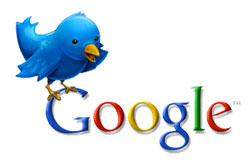|
Without a doubt, Facebook is the leader in social networking. Facebook has an active user base of 800 million people, 50% of whom log on in any given day. The average Facebook user has 130 friends. If you`re like me, Facebook allows you to keep in touch with friends scattered across the globe (I have one friend from college who sends updates as he lands on different aircraft carries around the world), as well as colleagues and friends here in town.
 To Google`s search engine, Facebook is often a dark, black void of information. Unless you post status updates to “public” (as I often do), your posts to friends are often off-limits to outside search engines. This is good if you were dancing on the tables at the bar last weekend with friends and you`re now trying to apply for a job. To Google`s search engine, Facebook is often a dark, black void of information. Unless you post status updates to “public” (as I often do), your posts to friends are often off-limits to outside search engines. This is good if you were dancing on the tables at the bar last weekend with friends and you`re now trying to apply for a job.
Google started the Google+ system as a response to the possibility of being “cut off” from 800 million users, and as a way to bolster their search engine ranking results.
Is it working? Google+ traffic jumped by 55% in December 2011. And Google+ is expected to have 85 million users by Feb 1, 2012. While it`s not even 10% of Facebook`s audience, Google+ is growing in influence.
Facebook “Like” vs. Google+ “+1”
With Facebook, you can “Like” something (a photo, post, or video).
With Google+, you “+1” something (a photo, blog post, or even a paid ad).
Most relevant for search engine marketing: Google uses +1s (and Facebook Likes, when possible) to influence their search engine rankings.
Google & Inbound Links, and why it matters for Google+
On a very simplistic level, Google works much like a dreaded high school popularity contest. If 250 people all point over to one person (i.e. “Lori”) and say that Lori is most popular person in the entire high school class, that person is going to “rank” a lot higher than the person that has only 2 people pointing to them.
Google basically does this measurement by counting how many inbound links a web page has, and how influential each of those referring sites are. A high-ranking site linking to your site is worth a lot more than dozens of low-ranking sites.
For a tangible example, on January 1, 2012, CNN.com (Page the 19th most visited ) linked to my wife`s website, www.GodUpgrade.com, as her prediction for 2012 was one of 15 they chose to run on their site. That inbound link is an external validation to Google that the God Upgrade site is really important.
The issue is that inbound links have limitations. By measuring 60 million Google+ users who +1 a link or page, Google can (and does) assign pages more significance.
Unlike a Facebook “Like,” Google+ “+1″s are asynchronous… and some are worth more than others.
In order to understand this, it`s important to understand the difference between Facebook, Twitter and Google:
Facebook vs. Google vs. Twitter.
Facebook = Synchronous (all friends are treated equally)
When Google launched Google+, they listened to many of the current complaints of Facebook users. One of the top ones was “friend creep,” or having so many friends on Facebook, many of whom you may not know very well.
Facebook has traditionally been a synchronous system: you must be friends with someone, and they have to be friends back with you in order to see their profile, post, and communicate.
(That said, in Facebook you can now “subscribe” to people without becoming friends. Or, you can create lists, such as family, work colleagues, that allow you to break the “I`m your friend / you`re my friend” relationship.)
Twitter broke from this 1:1 relationship by allowing a person to follow anyone, but that person didn`t have to follow you back. In fact, your measure of clout on Twitter is measured by how many follows you have (vs. how many people you follow). If you have 30,000 people following you, and you are only following 30-40 people, that means that you likely have something interesting to say. Google sees a link tweeted by a top user as more influential than someone with only 30 followers. Is it fair? Not really. But it is a measure of relevance.
Google+ is asynchronous: you can follow people, and they don`t have to follow you.
Google+ is also tightly tied into other systems, including Google+ business pages tied to a website, author attribution via rich snippets, and social ad extensions.
Summary:
If you haven`t signed up for Google+, or created a Google+ business page, it`s time to give it a whirl.

|
![]()
![]()
![]()
![]()
![]()
![]()